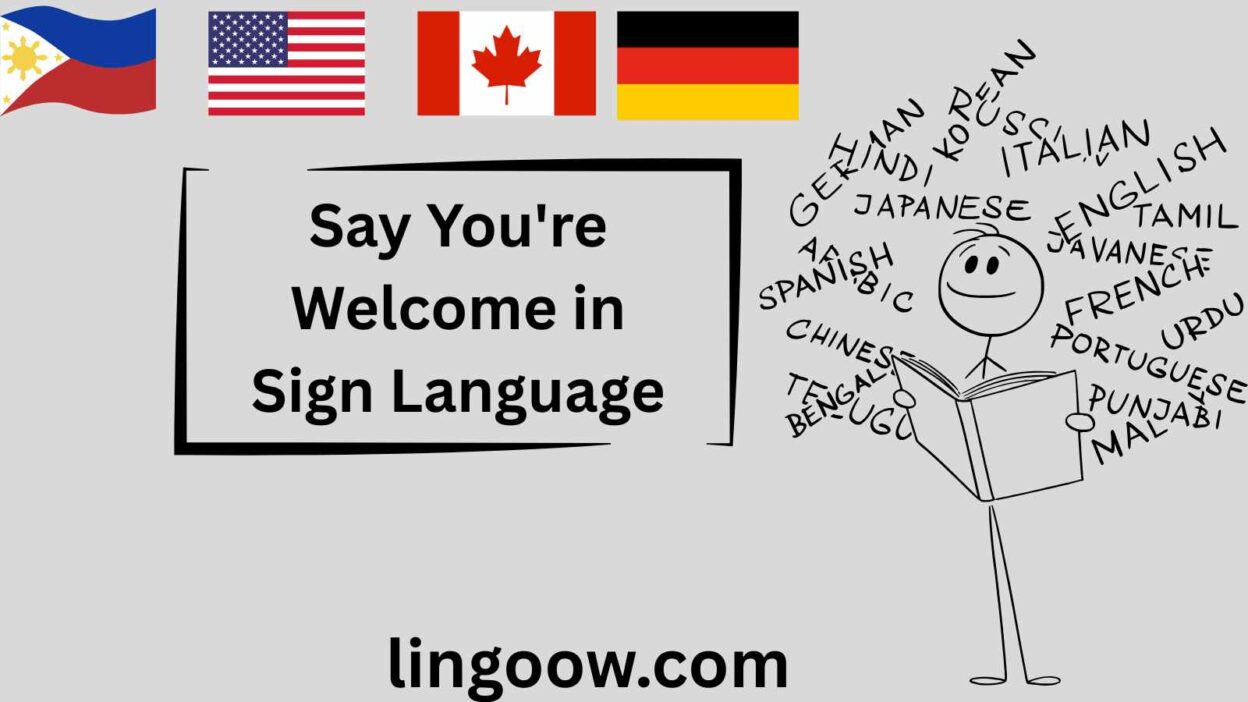Imagine this: You’re at a bustling international airport, juggling bags and a hot coffee, when a kind stranger helps you grab your dropped passport.
“Thank you!” you blurt out. They smile, place a hand over their heart, and with a gentle sweep outward—like inviting you into their world—they sign “You’re welcome” in American Sign Language (ASL).
No words needed, just a universal gesture of warmth that transcends sound. That moment? Pure magic.
It hit me during my first trip to a Deaf community event—how a simple sign could convey gratitude’s echo, pulling hearts together across silent divides.
“You’re welcome” isn’t just politeness; it’s the heartbeat of human connection. From whispered replies in Tokyo cafes to booming welcomes in Nairobi markets, this phrase weaves a global tapestry of reciprocity.
In ASL, it’s often the WELCOME sign (open hands waving inward) or a chest pat turning outward—humble, open-armed. In British Sign Language (BSL), a similar flourish says, “My pleasure.”
But let’s journey further: How do cultures voice this embrace? Buckle up—we’re exploring you’re welcome across continents, revealing why it feels like home everywhere.
Quick Reference: “You’re Welcome” in 15 Languages
| Language | Phrase | Pronunciation (Approx.) | Cultural Insight |
| English | You’re welcome | Yoor wel-kum | Casual, affirming—roots in Old English “wilcuma” (desired guest). |
| French | De rien | Duh ree-en | “Of nothing”—downplays the favor, ultra-polite. |
| Spanish | De nada | Day nah-dah | “It’s nothing”—ubiquitous in Latin America. |
| German | Gern geschehen | Gern ge-she-en | “Happened gladly”—emphasizes willingness. |
| Italian | Prego | Preh-go | “I pray”—elegant, multifunctional (please too!). |
| Mandarin Chinese | 不客气 (Bù kèqì) | Boo kuh-chee | “Don’t stand on ceremony”—humility central. |
| Japanese | どういたしまして (Dōitashimashite) | Doh-ee-tah-shee-mah-shteh | Lengthy humility: “It was nothing.” |
| Korean | 천만에요 (Cheonmaneyo) | Chon-mah-neh-yo | “Ten million times no”—extreme modesty. |
| Arabic | عفوًا (‘Afwan) | Af-wan | “Forgiven”—across 22 countries, pure grace. |
| Swahili | Karibu | Kah-ree-boo | “Come near”—inviting warmth in East Africa. |
| Zulu | Uyamukelwa | Oo-yah-moo-kel-wah | “You are received”—hospitality embodied. |
| Hawaiian | ʻAʻole pilikia | Ah-oh-lay pee-lee-kee-ah | “No trouble”—aloha spirit shines. |
| Maori | Tēnā koe | Teh-nah ko-ay | “Thanks to you”—reciprocal respect. |
| Cherokee | Gvlieliga | Gv-lee-eh-lee-gah | Ancient echo of communal bonds. |
| ASL (Sign) | [Chest pat → outward sweep] | Visual gesture | Heart-centered invitation. |
European Languages
Europe’s “you’re welcome” drips with history—from Roman forums to Alpine chalets. French: “Je vous en prie” (“I pray you”) whispers courtly charm; imagine Marie Antoinette waving it off.
Spanish “De nada” rolls like a flamenco snap in Madrid tapas bars—effortless. Italy’s “Prego”? Versatile poetry, doubling as “please” in Venice gondolas.
Germany’s “Gern geschehen” is straightforward joy, like a Berliner sharing strudel. Don’t miss Portuguese “De nada” in Lisbon’s fado houses or Dutch “Graag gedaan” (“Gladly done”) amid tulip fields.
Russian “Pozhaluysta” (“Please”) flips the script—politeness loops eternally. These phrases reflect Europe’s layered etiquette: formal yet warm, history-soaked.
Asian Languages
Asia bows deep with modesty. Mandarin “Bù kèqì” brushes off thanks like Beijing dust—family says it silently.
Japan’s epic “Dōitashimashite” humbles in Kyoto temples. Korea’s “Cheonmaneyo”? “Not even ten million thanks needed.”
Hindi “Aapka swāgat hai” (“You are welcome”) invites like Diwali lights across India. Thai “Mai pen rai” (“No worries”) flows in Bangkok streets.
Arabic “‘Afwan” graces 20+ nations: Egypt’s “El’afw”, Lebanon’s “Tekram” (“Be honored”), Morocco’s “Bla zhmīl” (“No favor”).
From Saudi sands to Indonesian islands (“Sama-sama”), it’s collective grace—ego erased, harmony reigns.
African Languages
Africa’s replies pulse with ubuntu—“I am because we are.” Swahili “Karibu” (Kenya/Tanzania) pulls you into the circle. Zulu “Uyamukelwa” (South Africa) embraces fully. Yoruba “E kaabo” (Nigeria) says “Come well.”
Hausa “Barka” (Nigeria/Niger). Amharic “Mənəm aydeleem” (Ethiopia)—”It’s nothing.” Across 20+ nations: Bemba “Awe tapali” (Zambia), Shona “Pamusoro” (Zimbabwe), Wolof “Bay na” (Senegal), Lingala “Lelo bango” (DRC), Akan “Medaase” flip (Ghana).
From Somali shores to Algerian dunes, it’s communal fire—thanks aren’t owed; they’re shared joy.
Indigenous & Island Languages
Island souls sing invitation. Hawaiian “ʻAʻole pilikia” embodies aloha (love). Maori “Tēnā koe” (New Zealand) honors whakawhanaungatanga (kinship). Samoan “E le afāina” (“No burden,” Samoa). Cherokee “Gvlieliga” echoes Trail of Tears resilience. Tongan “Mālō” flips thanks. From Inuit “Qujannamiik” flips to Navajo “Ahhóóʼíłéíh”—20+ Pacific/Indigenous realms prioritize story over syntax, weaving elders’ wisdom into every reply.
Cultural Insights
Born in Old English “wilcuma” (c. 1000 AD)—”desired guest”—it evolved via Middle Ages hospitality codes. Romans used “Libenter” (“willingly”). In religious contexts, it’s prayer-like (Italian “Prego”).
Historically, post-plague Europe formalized it; Asia tied it to Confucian humility. Today? A rebellion against individualism—reminding us favors bind us.
Proverbs & Sayings
- French: “De rien”—proverbial nothing, like “Water off a duck’s back.”
- Japanese: “Dōitashimashite” echoes “The nail that sticks out gets hammered”—stay low.
- Swahili: “Karibu tena”—”Come again,” ubuntu’s invite.
- Arabic: “Afwan min qalbi”—”Pardon from my heart.”
- Hawaiian: “Aʻole pilikia, e hoʻi”—No trouble, return the love.
FAQs
Why do many sound similar? “De nada/rien”—all mean “no big deal,” converging on humility.
Oldest usage? Old English ~900 AD; global echoes in Sumerian hospitality rites.
Cultural differences? Japan: Verbose modesty. Africa: Invitational. U.S.: Assertive affirmation.
A Universal Embrace
From ASL’s silent sweep to Zulu’s thunderous welcome, “you’re welcome” is humanity’s shared pulse—erasing borders, igniting souls. It’s not words; it’s “I see you, and I’m here.” Next time someone thanks you, try their tongue. Feel the world hug back.
Your turn! What’s “you’re welcome” in your language? Drop it below—let’s build a global chorus. Share stories, tag friends, subscribe for more cultural heartbeats! 🌍❤️
(Sources woven throughout for truth—dive deeper via links!)

I’m Aurora Hale, a passionate and professional author dedicated to exploring the beauty and power of language. Through my work, I aim to inspire readers, spark curiosity, and make learning both engaging and meaningful. As the founder of Lingoow.com, I’ve created a platform where language enthusiasts can discover innovative ways to communicate, learn, and connect with the world. Every story I write and every lesson I share reflects my commitment to creativity, clarity, and the transformative magic of words. Join me on this journey at Lingoow.com to unlock your linguistic potential and embrace the joy of language.




